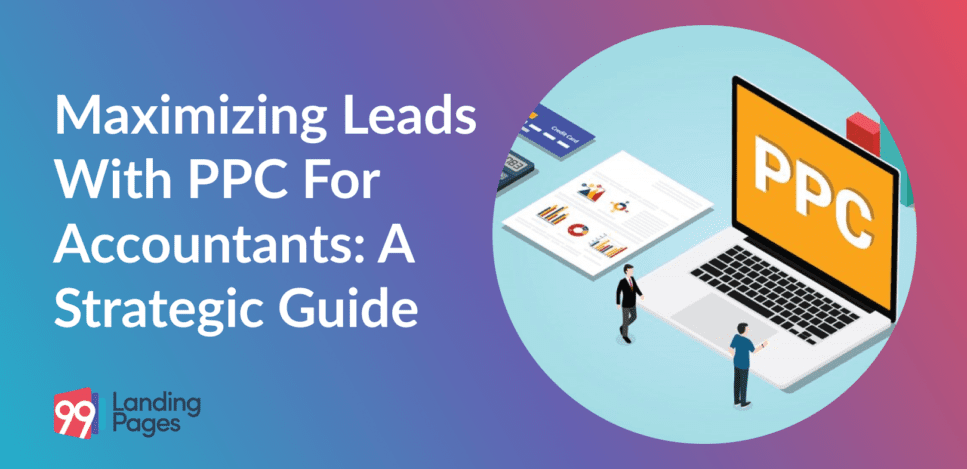Ever heard the saying, “Numbers don’t lie”? With PPC, accountants can leverage the power of numbers to gain visibility online and make their mark.
You see, PPC isn’t just another buzzword. It’s a golden ticket that lets accountants like you enter the limelight of online visibility. Think of it as your billboard on the internet highway – but more innovative and cost-effective.
But what makes PPC so crucial for accountants? Why should you care?
The answer lies not only in boosting your firm’s visibility but also in driving lead generation. But also because this post promises to guide you through creating successful PPC campaigns tailored specifically for accounting firms.
Table of Contents:
- Understanding PPC for Accountants
- Benefits of PPC for Accountants
- Critical Elements of a Successful PPC for Accountants
- Steps to Implementing a PPC For Accountants
- Mistakes to Avoid in Accounting PPC Campaigns
- Case Study – Successful Accounting Firm’s PPC Campaign
- Tips for Optimizing PPC For Accountants
- Hiring a PPC Agency vs. DIY for Accountants
- FAQs about PPC for Accountants
- Conclusion
1. Understanding PPC for Accountants
Bidding for visibility is the essence of Pay-Per-Click (PPC) advertising, a crucial part of digital marketing in the accounting industry. It’s like bidding on visibility – you pay to get your ads seen and clicked by potential clients.
In simple terms, PPC is an online auction where advertisers bid on keywords relevant to their target audience. Imagine it as renting space at the top of search results – but instead of paying upfront for that spot, you only pay when someone clicks on your ad. This approach can help accountants reach prospects actively searching for their services.
The core functionality of Google Ads, one popular platform used for PPC campaigns, relies heavily on this concept. The relevance and quality of your ads, plus what you’re willing to spend per click, play significant roles in determining if your ad gets shown.
The Relevance Factor: Keywords
Utilizing PPC for accountants involves picking the correct keyword phrases that make all the difference in getting your ad noticed by potential clients seeking accountant services.
“Accounting Services Near Me” or “Tax Consultant For Small Business” could be good starting points when choosing targeted keywords.
Google Keyword Planner can help you find relevant keywords and estimate their search volumes. It provides insights into search volumes, enabling data-driven decisions.
By refining keyword strategy, accountants can tailor ads to their target audience, maximizing PPC effectiveness and ROI.
Budget Allocation: How Much To Bid?
When you run a PPC (Pay-Per-Click) campaign, you have the flexibility to determine the value of each click based on various factors, such as the level of competition and the financial benefit of acquiring a new customer.
However, it’s important to remember that there may be better strategies than simply outbidding your competitors. Google also considers your ad’s relevance and your landing page’s user experience.
Landing Page Experience:
A successful PPC campaign depends on optimizing its landing page for lead generation and conversion, not just attracting clicks.
To achieve success, it is imperative to provide visitors with a clear and concise path, pertinent information about the services offered, and an easily accessible means of communication. Doing so dramatically increases the likelihood of converting visitors into clients.
To this end, it is essential to ensure the path is straightforward and unambiguous, with all relevant details clearly and concisely presented. This includes providing visitors with a comprehensive overview of the services offered and all pertinent pricing information or other details that may be interesting.
In addition, it is essential to ensure that visitors have easy access to a means of communication, such as a phone number or email address. This allows them to contact the business quickly and easily should they have any questions or concerns.
Overall, by providing visitors with a clear and concise path, relevant information, and easy access to communication, businesses can significantly improve their chances of converting visitors into clients.
If you are searching for a conversion-focused landing page, this accounting landing page template is tailored to elevate your lead generation efforts. Here is a full breakdown of the landing page template.
2. Benefits of PPC For Accountants
Pay-per-click (PPC) advertising is a standout tactic among the numerous options available in digital marketing, providing instant outcomes and quantifiable effects.
But why should accountants consider this route? Let’s break down the benefits.
Incredible Visibility
As an accountant, it’s essential to ensure your firm is visible to potential customers requiring your expertise.
A well-designed PPC campaign can significantly increase your visibility, placing you at the top of search engine results pages (SERPs). This isn’t just about boasting; it’s a proven method for boosting traffic and generating leads.
Capturing Quality Leads
A strategic PPC campaign lets you reach those individuals actively searching for accounting services – people who are already interested in what you offer. That means every click on your ad could lead to a new client relationship or business opportunity.
Budget-Friendly Advertising
Worried about costs? Don’t be.
With PPC, you only pay when someone clicks on your ad – making it more cost effective than traditional forms of advertising. You also control how much money goes into each campaign, making budgeting easier.
Data-Driven Results
The beauty of PPC lies in its measurability. Unlike other strategies where success may seem nebulous, everything from impressions and clicks to conversions can be tracked with PPC campaigns. This data gives you a clear picture of your ROI and helps refine future strategies.
Although PPC offers significant advantages, it requires continual optimization to ensure excellent performance. It needs regular tweaking and optimization to keep delivering stellar results.
3. Critical Elements of a Successful PPC For Accountants
For accountants, a successful PPC campaign can differentiate between success and failure in digital marketing. But it’s not just about creating ads and waiting for leads to pour in. It involves several key elements that you need to get right.
Keyword Research
The foundation of any successful PPC campaign lies in effective keyword research. As an accountant, your keywords should be relevant to your services and the search terms potential clients use when looking for accounting help online.
Tools like Google Keyword Planner can provide insights into high-performing keywords within your industry.
Ad Creation
Crafting compelling ad copy is another critical element. Your ad text must speak directly to your audience’s needs while highlighting what differentiates you from other accounting firms. The power words or phrases that trigger emotion or call-to-action are often beneficial here.
Landing Page Optimization
Your landing page is a crucial element in your online marketing strategy. It is the first page that your potential customers see after clicking on your ad. Therefore, it is essential to have a well-designed landing page that convinces them that they have made the right choice.
A well-designed landing page can significantly improve conversion rates by providing precise and concise information tailored to your clients’ needs.
If you’re looking to create a conversion-focused Accounting landing page, consider using the template provided by 99LandingPages.com. The template is designed to help you create optimized landing pages for conversions.
Using the template, you can easily create a conversion-focused landing page without coding skills. The design is tailored to accounting business and is more likely to convert visitors into customers.
Conversion Tracking
Last but certainly not least is tracking conversions – monitoring how many clicks lead to desired actions such as form submissions or direct contact calls. Tools like Google Analytics allow you to follow these metrics, helping you understand what works and where improvements are needed.
Your accounting firm can make the most of PPC campaigns by mastering these essential elements – keyword research, ad creation, landing page optimization, and conversion tracking. It’s not just about getting eyes on your ads; it’s also about converting those views into clients.
4. Steps to Implementing a PPC for Accountants
Breaking down the process of setting up a successful Pay-Per-Click (PPC) for accounting can make it feel less daunting, similar to solving a Sudoku puzzle.
a) Define Your Goals
Your initial step should be deciding what you wish to achieve from the campaign. Are you aiming for brand visibility? Lead generation? Customer conversions? Your goals will guide every other decision in the process, so be specific and realistic.
b) Identify Your Target Audience
To effectively market your accounting services, it’s essential to identify the characteristics and desires of your target audience. By understanding their needs, wants, and pain points, you can demonstrate how your services can help solve their problems or meet their objectives.
Show them how your accounting services can address their issues and help them achieve their goals.
c) Allocate Your Budget
PPC campaigns are highly flexible and can be tailored to fit almost any budget. However, it’s essential to remember that quality is more important than quantity. Instead of trying to cover all possible keywords, it’s better to focus on the ones that are relevant and valuable for accountants.
d) Monitor & Optimize the Campaign Regularly
Last, monitoring performance closely using tools such as Google Analytics is essential. This allows us to track metrics and make real-time adjustments based on actual results rather than guesses.
Please remember that building a successful PPC campaign takes time and effort. Being patient and willing to adjust to achieve the best results is essential.
Keep this guide close as you navigate the process, and your accounting firm will thrive online. Remember, Rome wasn’t built in a day!
5. Mistakes to Avoid in Accounting PPC Campaigns
Regarding PPC for accountants, there’s a fine line between success and falling flat. Beware the details, for they may lead to failure. Let’s delve into some common pitfalls you should sidestep when running your PPC campaigns.
Poor Keyword Selection
Selecting the right keywords is like picking ripe fruit from a tree. If you choose the right ones, you’ll end up with something that needs to be more appealing. Broad keywords can attract unqualified clicks, which can drain your budget without delivering results.
Instead of generic terms like ‘accounting services,’ try using more specific phrases like ‘tax accounting for small businesses.’ This will help you attract the right audience and get better results.
Neglecting Ad Copy
Ad copy is like an elevator pitch, and it should be persuasive enough to make users click on your accounting ad. However, it’s essential to remember that the message and value proposition should not be obscured by flowery language. Keeping the copy clear and concise is vital to communicate the intended message effectively.
Having copy that is both easy to read and relevant to your audience is crucial for improving your ad’s click-through rate.
Learn more about Copywriting Secrets here.
Inadequate Landing Page Design
It’s crucial to ensure that your landing page provides a good user experience, especially after getting someone to click on your ad. A poor landing page experience can be compared to inviting guests over to your house but needing more seats for them to sit on.
To make your landing page effective, it should be aligned with the user’s search intent and have clear call-to-actions (CTAs).
Remember: In PPC campaigns, mistakes happen, just like in life. But by learning to avoid these common pitfalls, you’re already one step closer to a successful accounting PPC campaign.
6. Tips for Optimizing PPC for Accountants
PPC for accountants can be a game-changer. Using PPC, accounting firms can increase their online visibility, generate leads, and grow their business. With the right optimization strategies, accountants can effectively target their audience and maximize their ROI.
To make your campaign stand out, it’s crucial to implement effective optimization strategies.
Focus on Quality Score
Your Quality Score, provided by Google Ads, acts as a report card for your PPC campaigns. It indicates the quality and relevance of your keywords and ads. The higher your Quality Score, the lower your cost per click will be.
To boost this score:
- Create highly relevant ad groups that match closely with keyword phrases.
- Ensure each landing page provides value and matches what users expect from the ad copy.
- Maintain a high Click Rate (CTR), which signals to Google that users find your ads helpful.
Leverage Negative Keywords
Negative keywords are a helpful tool that excludes specific search terms from triggering unwanted impressions.
For example, if an accounting firm is running a campaign targeting ‘tax advice’ and they add ‘free tax advice’ as a negative keyword phrase, their ad won’t show up when someone searches for ‘free tax advice.’
This can help save precious budget spent on irrelevant clicks while also improving click-through rates (CTRs) and Quality Scores, two crucial factors that influence the success of your campaign.
Prioritize Continuous Testing
To achieve the best results for PPC campaigns, it is crucial to continuously test all the elements involved in creating the PPC for accountants.
Firstly, try different headlines or calls to action in your ad copy to see what works best. Secondly, test variations of content, layout, or form fields in your landing pages to see which generates the highest conversion rates.
Finally, regularly analyze and adjust your keyword lists based on their performance. By implementing these optimization strategies into your PPC campaigns, you will drive traffic and attract targeted leads that are more likely to convert. Isn’t that a neat trick?
7. Hiring a PPC Agency vs. DIY for Accountants
As an accountant, you’re well-versed in balancing numbers and managing finances. Considering your expertise in managing finances, why not take the initiative and explore the realm of Pay-Per-Click (PPC) advertising?
The DIY Route
If you are always eager to explore new areas and take on challenges, managing your own PPC campaigns can be an exciting opportunity. It allows you to have complete control over every aspect of your campaign, from selecting the right keywords to allocating your budget effectively.
However, it is important to keep in mind that mastering PPC is not an easy task. You will need to invest time and effort to learn about various areas such as keyword research, ad creation, and landing page optimization, just to name a few.
Hiring A Professional Agency
Moving on to the other side of the coin, hiring a professional agency allows accountants like yourself access to experienced experts right off the bat.
An established agency brings experience with various industries and trends at their disposal, which means they can create optimized campaigns tailored specifically for accounting firms.
While this option requires more financial investment upfront than doing it yourself, considering long-term results and saved learning curve time – this could be a cost-effective strategy indeed.
A Balanced Approach?
There is no one-size-fits-all answer when it comes to managing PPC campaigns. The best approach depends on individual circumstances and available resources.
One option is to start by managing your campaigns and then bring in an agency when things become more complex or time-consuming.
This approach will give you an understanding of the intricacies of PPC marketing. When you collaborate with specialists, your partnership will be more effective.
Remember The Key
It’s not just about choosing between DIY and an agency. The most essential thing is ascertaining that the choice you make fits your requirements.
FAQs About PPC for Accountants
What is a PPC in accounting?
PPC in accounting refers to Pay-Per-Click advertising. It’s a digital marketing method where accountants pay each time their ad gets clicked by potential clients.
What is PPC in finance?
In finance, PPC stands for Pay-Per-Click. Financial firms use it to attract new clients online by paying for each click on their ads.
How much does a PPC charge?
The cost of a PPC campaign varies based on factors like industry competition and keyword popularity. On average, though, it ranges from $1 to $2 per click.
What does PPC stand for?
‘PPC’ stands for ‘Pay Per Click.’ It’s an internet marketing model where advertisers shell out cash every time someone clicks on their online advertisements.
Conclusion
PPC for accountants isn’t just a trend; it’s an investment. An investment in visibility, lead generation, and measurable growth.
The key to unlocking its potential? It lies within understanding PPC’s functionality and aligning it with your firm’s goals.
Success comes from careful keyword selection, creative ad copywriting, effective landing page design, and meticulous tracking of conversions. And remember – avoiding common pitfalls is as crucial as implementing the right strategies.
A well-executed campaign can deliver exceptional results; think of an increased online presence or new client leads that grow your business exponentially!
What is your next step? Take these insights into action! Remember: With PPC for accountants, you’re not just crunching numbers – you’re making them work harder for your success!
Related Blogs:
PPC vs CPC: Understanding Key Differences
How To Use Psychology of Colours In Marketing Campaigns
Lead Generation For Nonprofit Organisations: Complete Guide
Our Featured Templates
Digital Marketing Landing Page Template
Product Landing Page Template
Business Coach Landing Page Template





